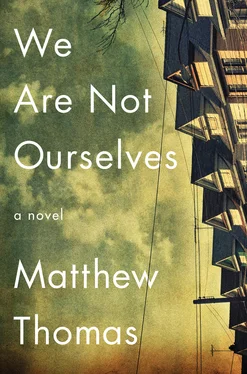She hadn’t built a dynasty. She wasn’t even sure there would be a continuation of the line. Her son had gone back to Chicago to school, but she couldn’t help worrying about him, and in a more elemental way than she’d ever worried before. She’d begun to worry less about what sort of foundation he was laying for her future grandchildren — God willing, he would meet a nice girl and settle down and have kids — and more about his own future.
She wanted to rejoice with Donny, but she didn’t know how to begin to reach out to him after all this time and silence. She fingered the business card and then put it in her wallet. She thought, I hope you have a wonderful life. I hope you have a lovely big backyard. I hope you flip steaks and watch your daughters run around and think , I could die in peace.
She rose and walked over to stand in front of her old house. The new owners had let the garden grow up over the garden box and had restained the doors, and new drapes hung in the window in a style she didn’t prefer, but it was unmistakably her house. She’d stood so many times where she now stood, appraising it, and a surge of affection shamed the memory of her desperation to escape it. She stepped onto the stoop.
The lights had come on in the streetlamps, but the evening hadn’t yet submitted to night. She wanted to be transported back to a time when this had been her life. The birds in the trees made their entreaties, cars flew down the street, and the smooth paint of the banister brought the skin of her palm to life. She closed her eyes and listened to the familiar sounds of a disappearing plane and a distant horn and breathed in that strangely appealing mix of car exhaust and leaves. She could have been arriving back after a long day at Lawrence, or following Ed and Connell up the stoop after Sunday dinner at Arturo’s. She could go inside and find Ed on the couch wearing the headphones. She would say to him, Listen as long as you want. Listen to all your records. I’ll be right here when you’re done. I’ll wait years if I have to. She would take his hand in her hands and kiss the back of it with enough tenderness to show him it wasn’t a gambit. Let’s just stay right here , she would say. Let’s stay here forever .
She didn’t know these people, but she was beginning to feel she couldn’t return home without seeing the house. She’d spent a lifetime running, and she was tired. There had to be some way to fit the past into the present, even if she’d turned her back on it.
She took the knocker in her hand and gave the door three quick, emphatic taps. A young man answered. It was hard to reconcile him with the boy — he must have been seven or eight then — she’d seen standing out front when his parents were leaving the open house. He was tall and broad, and his hair was neatly brushed. He had the bright, white smile of an elected official.
“Can I help you?”
It unsettled her to be greeted as a stranger at her own house. She had to squelch the pride that threatened to ruin this venture before it had even begun.
“My name is Eileen Leary,” she said. “I used to live here.”
She felt like one of those furtive talkers who went from door to door proselytizing for obscure faiths and doomed causes. She wouldn’t have been surprised or blamed him if he’d closed the door before she finished her halting appeal. But he invited her inside.
“I don’t want to be a bother,” she said as she crossed the threshold.
“Not at all,” he said. “Would you mind taking off your shoes?”
It was a custom she’d long thought of putting into practice in her own home, but she’d never found a way to introduce it. The vestibule tiles were cold on her stockinged feet, but the plush carpet sank pleasantly under her as she entered the living room. They kept a television where her armchair used to be. The set looked so inviting that she wondered why she and Ed had deprived this space of one for so long. She watched the father, Mr. Thomas as she remembered it, slap his elegant hands on his knees and stretch his long body as he rose from the couch.
The boy began to introduce her, but his father cut him off. “I know who you are,” he said affectionately. “Welcome back! Does it look the same to you? My wife is making dinner. Anabel! Come in here.”
The décor was so different that she had trouble gauging the depth and width of the room; it seemed that the space itself, which had given her so much trouble in her decorating efforts, being always a foot too wide or too narrow, had compliantly shifted its dimensions to fit the needs of the new owners, finding its natural harmony in the process, as if it had been waiting for them to arrive. When she looked into the dining room, though, and saw the old wall-sized mirror, she was seized by a pang so strong it made her stomach lurch. There was a greater profusion of things both big and small, the kind that would have nettled her in her own home but that here suggested a fruitful multiplication.
“I like what you’ve done with the place,” she said, and felt instantly foolish. It had been almost eight years. They hadn’t “done” anything with it; they’d simply made it their own, or what they’d done with it had been done so long ago that it was absurd to speak of it.
They stood around in one of those benignly awkward circles that obtained whenever men were responsible for making introductions. She saw the boy sneak a look at the television and felt her heart bloom with an instant affection, because it was what her son would have done in the same situation.
Casting about for something to say, she noticed, on an end table, a trophy capped with a winged figure arching her arms in triumph. “What’s this?” she asked brightly, picking it up. It was heavier than she expected, not like the flimsy trophies for dance recitals or participation in Little Leagues.
“He won it in debate,” the father said. She remembered that his first name was Thomas too. “The state championship. We’re very proud of him.”
“Don’t let him fool you into thinking I was the champion,” the boy said. “I came in second.”
“This year he will be,” the father said.
She saw that the boy was uncomfortable with the attention, and she put the trophy down. She remembered they were Catholic. “Did you go to St. Joan of Arc?” she asked.
“I did,” the boy said. “From third grade on.”
“So did my son.” She guessed the boy was attending the same high school as Connell, which was a powerhouse in debate, but she didn’t want to embarrass him by asking, in case he hadn’t gotten in. “You have a sister, I remember. Is she here?”
“She’s at Yale,” Mr. Thomas said proudly. “We don’t see her often. Only holidays — and every other weekend, when she needs to do the laundry.” He chuckled at the absurdity of her coming all that way to wash her clothes, but Eileen also heard delight in the fact that his daughter, while being a high achiever on her way to a rewarding professional life, was still, in the end, his daughter.
Just as a heavy feeling was about to settle into Eileen at how long it had been since her son had washed his clothes in her machine at home, which she now ran only about once a week, Mrs. Thomas emerged from the kitchen and let out a surprised cry at seeing a stranger there. She must have been so absorbed in her cooking that she hadn’t heard the knock at the door. Eileen knew that feeling well — the exigencies of household duties, the making of a meal for a pair of mouths that showed their appreciation by the way they wolfed it down. It had always moved her to watch her husband and son eat.
“Hello,” the woman said, turning to her husband for an explanation.
“Anabel, this is Mrs. Leary.”
Читать дальше
Конец ознакомительного отрывка
Купить книгу












